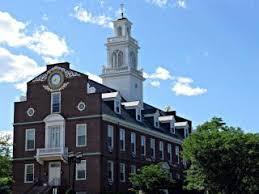Weymouth to Join Quincy in Considering Municipal Broadband Infrastructure

Mayor Robert Hedlund announced today that Weymouth has entered into discussions with Mayor Koch of Quincy to discuss possibilities for collaborating to improve broadband offerings for the approximately 150,000 residents spanning both municipalities. Weymouth is currently served by Comcast, though a 10-year agreement in that was entered into prior to Mayor Hedlund’s tenure. Frequently residents experience a lack of flexibility in coverage options and rates due to the lack of competition in private providers. To resolve this issue and provide other benefits, Quincy will look into a public option that could provide the infrastructure for fiber optic broadband cable networks and then solicit for service providers, and Weymouth plans to explore a similar effort and potentially collaborate with Quincy.
The municipal broadband model is implemented in many small, isolated communities that attempt to close coverage gaps or the “last mile” of broadband coverage for those that are underserved or not serviced at all by private service providers. However, several other larger communities also provide the fiber infrastructure through Municipal Light Plants as a way of moderating cost and promoting competition amongst providers. Neighboring towns like Braintree and Norwood have Municipal Light Plants that provide these types of utility services.
“As access to reliable broadband and internet becomes a necessity for a 21st century business or even just a homeowner, we need to start exploring ways to address this growing demand in our communities by expanding infrastructure and opening it up as an equal opportunity for providers,” said Mayor Hedlund.
Cities and towns across the country are building or expanding municipal broadband networks in an attempt to improve infrastructure, close gaps in coverage, and ultimately reduce costs through increased competition or a publicly-managed and funded resource. Many of these communities leverage existing municipal networks to expand a reliable service not only to their public facilities but also to private entities including businesses and homes, often referred to as fiber-to-home. As technology advances and fiber-optic cabling becomes industry standard, it is more important to have these networks in communities that would like to attract businesses and improve the customer (in this case resident) experience.
Because municipal-broadband is an infrastructure project - much like the provision of water/sewer, electricity, and roadways - leveraging economies of scale in large metro-areas has been proven to be a cost-effective way to implement these services. As such, Mayor Hedlund working with Mayor Koch of Quincy, will begin looking into the possibility of a municipally-managed broadband network.
“Overall, the ultimate goal is quality improvement for residents,” said Mayor Hedlund. “By leveraging an economy of scale and cost with a joint or concurrent approach with Quincy, I believe this could be a viable option worth exploring for the betterment of the communities.”
Larger cities around the country, like San Francisco, have recently put out Requests for Proposals to solicit vendors to build out public broadband networks while others, such as Santa Monica have built on long-standing existing municipal infrastructure. Similarly, Northampton, MA conducted a study in 2016 and recently appropriated funds to look into a feasibility study and implementation plan for 2020 and 2021. These cities are indicative of a growing trend for municipalities to take on provision of fiber optic cable as a part of public infrastructure.
Many municipalities that operate their own networks have seen additional benefits to other operations such as free public wifi, traffic signal synchronization, public safety video cameras, and real-time parking information.
Mayor Hedlund and Mayor Koch have only initiated discussions about the possibility for a municipal broadband infrastructure expansion and plan to continue discussions related to the feasibility of implementing municipally-built and managed fiber.

